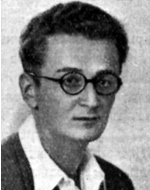Groberg, Israel
Son of Sheyna and Baruch, was born on May 12, 1962, in the city of Baku, Romania. His wealthy parents, lovers of Israeli tradition but without religious fanaticism, gave him the possibility of a thorough intellectual development. He attended a Jewish kindergarten and Jewish elementary school, and later a Hebrew Gymnasium in Galatz. He was active in the Gordonia movement, a member of the secretariat, and continued his activities there underground during the Second World War and during his forced labor in a German camp. In his underground activities he participated in organizing the shipping of the illegal immigrant ships to Palestine. In 1944 he immigrated to Israel with a group of his fellow members of the movement. They were caught as illegal immigrants and imprisoned in Atlit. After their release, they joined the Masada group in the Jordan Valley. In Israel he became acquainted with Berl Katznelson, whose personality fascinated him in the diaspora, and on his advice he went to the university in Jerusalem to study philosophy, social sciences and international relations. His teacher at the university testified that he was the most alert student in his faculty. Israel always sought an outlet for his energy and spiritual alertness. In order to support himself, he had to divide his time between his studies and work in the National Library, both as a clerk and as a guard. In his final year he was to receive the Bialik Prize and continue his studies at the London School of Economics. In December 1947, following the United Nations General Assembly resolution on the partition of the land, he and his fellow students left for the Hagana in Jerusalem in January 1948. In January 1948 he was sent to the Etzion Bloc, where he was subjected to harsh training and “first baptism.” In Gush Katif, on patrols and on guard duty, he made friends with the people of Masuot Yitzhak and prepared to conduct an evening of various problems that he had dealt with, but the situation worsened with the fall of the “LH” department and his plan was not implemented. At the end of January he returned to Jerusalem for a few weeks’ vacation to take his final exam in mid-February. He wrote his subject, “Human Rights and International Defense,” to the satisfaction of his teachers at the university and was pleased to hear from them about his success. A few days later, on the night of May 17-18, a force from the Jerusalem Brigade attempted to conquer the Tower of David and break into the Old City. The force encountered strong enemy fire and its progress was halted. In one of the houses on Mamilla Street, where they sought shelter, he was seriously injured and because of the prolonged shelling he was transferred very late to the hospital, where he died on 9 May 1948. He was buried in Sheik Bader Aleph on 28 Elul 5710 (10.9.1950) was transferred to eternal rest in the military cemetery at Mount Herzl in Jerusalem.
